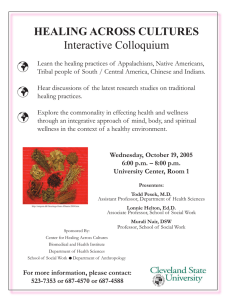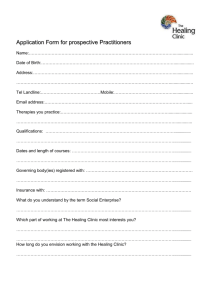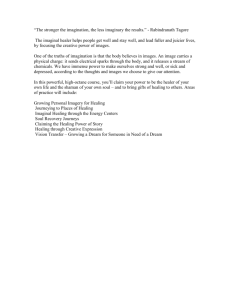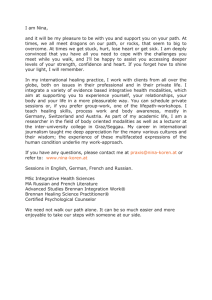Cosmetic Surgery for the Soul?
advertisement
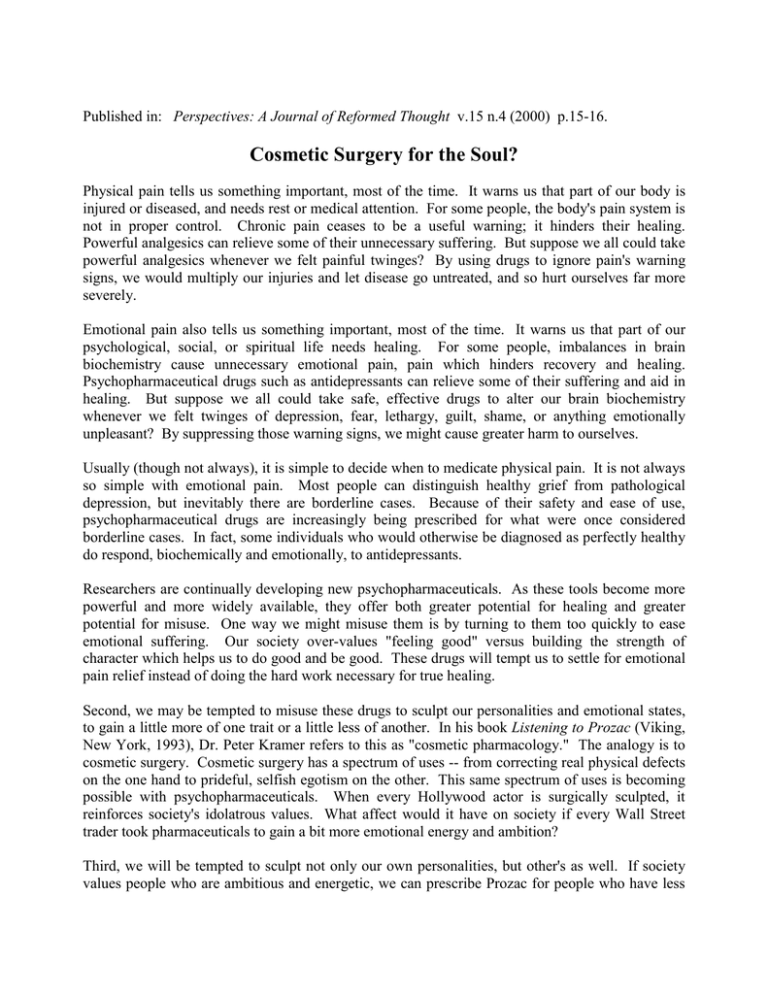
Published in: Perspectives: A Journal of Reformed Thought v.15 n.4 (2000) p.15-16. Cosmetic Surgery for the Soul? Physical pain tells us something important, most of the time. It warns us that part of our body is injured or diseased, and needs rest or medical attention. For some people, the body's pain system is not in proper control. Chronic pain ceases to be a useful warning; it hinders their healing. Powerful analgesics can relieve some of their unnecessary suffering. But suppose we all could take powerful analgesics whenever we felt painful twinges? By using drugs to ignore pain's warning signs, we would multiply our injuries and let disease go untreated, and so hurt ourselves far more severely. Emotional pain also tells us something important, most of the time. It warns us that part of our psychological, social, or spiritual life needs healing. For some people, imbalances in brain biochemistry cause unnecessary emotional pain, pain which hinders recovery and healing. Psychopharmaceutical drugs such as antidepressants can relieve some of their suffering and aid in healing. But suppose we all could take safe, effective drugs to alter our brain biochemistry whenever we felt twinges of depression, fear, lethargy, guilt, shame, or anything emotionally unpleasant? By suppressing those warning signs, we might cause greater harm to ourselves. Usually (though not always), it is simple to decide when to medicate physical pain. It is not always so simple with emotional pain. Most people can distinguish healthy grief from pathological depression, but inevitably there are borderline cases. Because of their safety and ease of use, psychopharmaceutical drugs are increasingly being prescribed for what were once considered borderline cases. In fact, some individuals who would otherwise be diagnosed as perfectly healthy do respond, biochemically and emotionally, to antidepressants. Researchers are continually developing new psychopharmaceuticals. As these tools become more powerful and more widely available, they offer both greater potential for healing and greater potential for misuse. One way we might misuse them is by turning to them too quickly to ease emotional suffering. Our society over-values "feeling good" versus building the strength of character which helps us to do good and be good. These drugs will tempt us to settle for emotional pain relief instead of doing the hard work necessary for true healing. Second, we may be tempted to misuse these drugs to sculpt our personalities and emotional states, to gain a little more of one trait or a little less of another. In his book Listening to Prozac (Viking, New York, 1993), Dr. Peter Kramer refers to this as "cosmetic pharmacology." The analogy is to cosmetic surgery. Cosmetic surgery has a spectrum of uses -- from correcting real physical defects on the one hand to prideful, selfish egotism on the other. This same spectrum of uses is becoming possible with psychopharmaceuticals. When every Hollywood actor is surgically sculpted, it reinforces society's idolatrous values. What affect would it have on society if every Wall Street trader took pharmaceuticals to gain a bit more emotional energy and ambition? Third, we will be tempted to sculpt not only our own personalities, but other's as well. If society values people who are ambitious and energetic, we can prescribe Prozac for people who have less of those qualities. If society values stay-at-home moms who are not ambitious, we can prescribe Valium (as was done in the 1950s) for those who are by nature too active. If society values thin people, new drugs can suppress appetite and alter metabolic rates. If society values quiet and wellbehaved children, there's always Ritalin. Fourth, whenever we find a drug helpful in altering some undesirable attitude or behavior pattern, we will be tempted to forget that deliberate sinfulness may also be part of the problem. We may forget the need for repentance, the need to rely on God as the ultimate source of healing. The secular world dislikes the concept of "sin." Our culture often teaches that if one's genes, childhood experiences, stress, or brain biochemistry contributed to the behavior, then one is no longer responsible for that behavior. But that is far too simplistic. Such a wholesale denial of responsibility ultimately dehumanizes us. Although these drugs probably will be misused, as Christians we should not simply eschew them. Conditions such as depression, hyperactivity, and obesity are physically as well as emotionally harmful. Responsible use of these drugs can genuinely ease suffering and promote healing. We need to articulate a responsible ethic for their use. This responsible ethic must acknowledge that we cannot compartmentalize our biological and psychological selves. We are whole beings. Our physical, neurological, emotional, social, and spiritual aspects form a unified whole. They affect each other in ways we are only beginning to understand scientifically. Therefore, true healing might need a mixture of medical, psychological and spiritual strategies. For some individuals, the first important step to healing an emotional and spiritual crisis will be a medical treatment (taking a drug, or simply getting the right food, exercise, and rest). For others, such medical treatments would only mask problems which must be addressed, first of all, through counseling, prayer, repentance, and spiritual disciplines. The right strategy must be tailored to each individual's situation, using our best judgment about which to emphasize, and in which order. Brain biochemistry affects us every day. Activities like eating junk food, drinking caffeine, or simply getting enough sleep and exercise affect how we respond to stressful situations, how easily we are angered, how attentively we listen to a friend, and how well we concentrate while reading the Bible, praying, and worshipping. At the end of a stressful day, you may desire both to pray about it and to eat some "therapeutic chocolate." If you turn first to chocolate, it might be so therapeutic that forget to pray; alternatively, it might help you think more clearly and pray more effectively. Again, discerning judgment is necessary. All of this falls under the idea of taking responsibility for a situation. Note the peculiar phrase, "taking responsibility." It acknowledges that factors beyond our control were, to some extent, responsible for our current unpleasant situation -- whether that is drug addiction, or depression, or a hateful or prideful attitude. However, now that we are aware of those factors, we can take responsibility for them. We can choose an effective strategy which combines spiritual, psychological, physical, and perhaps medical activities. The new psychopharmaceuticals being developed will aid in healing many people afflicted with uncontrollable emotional pain. They may also help many people change some of their sinful behavior patterns. As Christians, we must remember that sin does not start with, nor consist entirely of, nasty behavior towards other people. Sin starts with turning away from God. No matter what your genes, childhood experiences, or biochemical condition --- no matter how nice or nasty you happen to be at this moment due to factors beyond your control --- you always face the choice to turn towards God, or to turn away from God.
